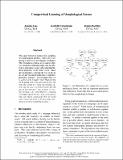Unsupervised Learning of Morphological Forests
Author(s)
Luo, Jiaming; Narasimhan, Karthik; Barzilay, Regina
DownloadPublished version (1.712Mb)
Terms of use
Metadata
Show full item recordAbstract
<jats:p> This paper focuses on unsupervised modeling of morphological families, collectively comprising a forest over the language vocabulary. This formulation enables us to capture edge-wise properties reflecting single-step morphological derivations, along with global distributional properties of the entire forest. These global properties constrain the size of the affix set and encourage formation of tight morphological families. The resulting objective is solved using Integer Linear Programming (ILP) paired with contrastive estimation. We train the model by alternating between optimizing the local log-linear model and the global ILP objective. We evaluate our system on three tasks: root detection, clustering of morphological families, and segmentation. Our experiments demonstrate that our model yields consistent gains in all three tasks compared with the best published results. </jats:p>
Date issued
2017Department
Massachusetts Institute of Technology. Computer Science and Artificial Intelligence LaboratoryJournal
Transactions of the Association for Computational Linguistics
Publisher
MIT Press - Journals